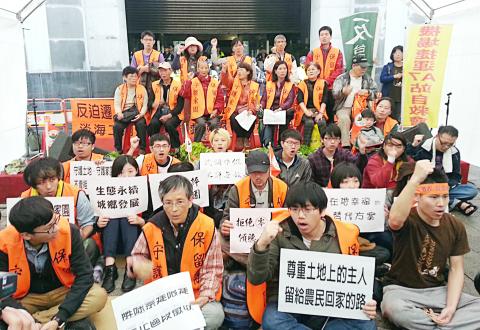Opponents of the phase-II development of Tamhai New Town (淡海新市鎮) yesterday asked the central government to evaluate the deal’s social and economic impact on the community and to hold a public hearing before setting the boundaries for the land seizure.
As the Environmental Protection Administration (EPA) was scheduled to hold its fourth meeting on setting the boundaries of the development yesterday, dozens of residents of New Taipei City’s Tamsui District (淡水), environmental activists and Tamkang University students camped outside EPA headquarters beginning on Wednesday night, to appeal to the public on the issue.
They protested before the meeting started yesterday morning and demanded that members of the review board go over the details of the development deal line-by-line.

Photo: CNA
Lu Cheng-chung (盧正忠), who is with a group opposing the town’s further development, said they thought the EPA was helping the Ministry of Interior’s Construction and Planning Agency rush through the boundary-setting meetings to get them done in one day.
Lu said the proposed phase-II development would force more than 1,600 households to relocate. He added that the new development is unnecessary because there are still many unsold houses and underdeveloped properties within the boundaries of the phase-I development.
“The Construction and Planning Agency said that the land expropriated for the phase-II development would be used to build an eco-friendly city and a ‘paradise for elderly citizens,’ but we feel that our environment is already rich in terms of biodiversity,” Lu said. “It is really gratuitous to destroy the biodiversity and build an artificial eco-friendly city. The elderly people in the community are, on the other hand, happy and self-sufficient. They do not need to be relocated so that a ‘paradise’ can be built for them.”
Lu said the government has planned to seize about 1,200 hectares of land for the phase-II development, with most of the targeted area being farmland.
Ling Hong Ching-tze (林洪清子), who is in her 80s, said this was not the first time that the government has seized her property. She said that she was once asked to give up 661 hectares for a section of highway to be built, and was compensated with just NT$1.7 million (US$56,000 at current exchange rates).
She added that she has been approached again by developers because of the project.
She said she was told that she would have to swap a larger area of land for a smaller one and buy back the land that she owned.
“I am pretty content with the land I have now, which has natural water coming from Datunshan (大屯山),” she said. “How can I find the money to buy back the land? And I should not have to buy back land that is mine.”
Residents supporting the development responded with their own data, saying that 542 households would need to relocate.
Tamsui District Administrator Tsai Yeh-wei (蔡葉偉) said that about 157 hectares of land to be expropriated are fallow farmland, with no trees, endangered species or historical sites to be protected.
One woman held a poster bearing the signatures of other residents who support the proposed development. She said development is good for the community, since more than 70 percent of its young people have left town to seek jobs elsewhere.

Chinese Nationalist Party (KMT) Chairman Eric Chu (朱立倫), spokeswoman Yang Chih-yu (楊智伃) and Legislator Hsieh Lung-chieh (謝龍介) would be summoned by police for questioning for leading an illegal assembly on Thursday evening last week, Minister of the Interior Liu Shyh-fang (劉世芳) said today. The three KMT officials led an assembly outside the Taipei City Prosecutors’ Office, a restricted area where public assembly is not allowed, protesting the questioning of several KMT staff and searches of KMT headquarters and offices in a recall petition forgery case. Chu, Yang and Hsieh are all suspected of contravening the Assembly and Parade Act (集會遊行法) by holding

PRAISE: Japanese visitor Takashi Kubota said the Taiwanese temple architecture images showcased in the AI Art Gallery were the most impressive displays he saw Taiwan does not have an official pavilion at the World Expo in Osaka, Japan, because of its diplomatic predicament, but the government-backed Tech World pavilion is drawing interest with its unique recreations of works by Taiwanese artists. The pavilion features an artificial intelligence (AI)-based art gallery showcasing works of famous Taiwanese artists from the Japanese colonial period using innovative technologies. Among its main simulated displays are Eastern gouache paintings by Chen Chin (陳進), Lin Yu-shan (林玉山) and Kuo Hsueh-hu (郭雪湖), who were the three young Taiwanese painters selected for the East Asian Painting exhibition in 1927. Gouache is a water-based

Taiwan would welcome the return of Honduras as a diplomatic ally if its next president decides to make such a move, Minister of Foreign Affairs Lin Chia-lung (林佳龍) said yesterday. “Of course, we would welcome Honduras if they want to restore diplomatic ties with Taiwan after their elections,” Lin said at a meeting of the legislature’s Foreign Affairs and National Defense Committee, when asked to comment on statements made by two of the three Honduran presidential candidates during the presidential campaign in the Central American country. Taiwan is paying close attention to the region as a whole in the wake of a

OFF-TARGET: More than 30,000 participants were expected to take part in the Games next month, but only 6,550 foreign and 19,400 Taiwanese athletes have registered Taipei city councilors yesterday blasted the organizers of next month’s World Masters Games over sudden timetable and venue changes, which they said have caused thousands of participants to back out of the international sporting event, among other organizational issues. They also cited visa delays and political interference by China as reasons many foreign athletes are requesting refunds for the event, to be held from May 17 to 30. Jointly organized by the Taipei and New Taipei City governments, the games have been rocked by numerous controversies since preparations began in 2020. Taipei City Councilor Lin Yen-feng (林延鳳) said yesterday that new measures by